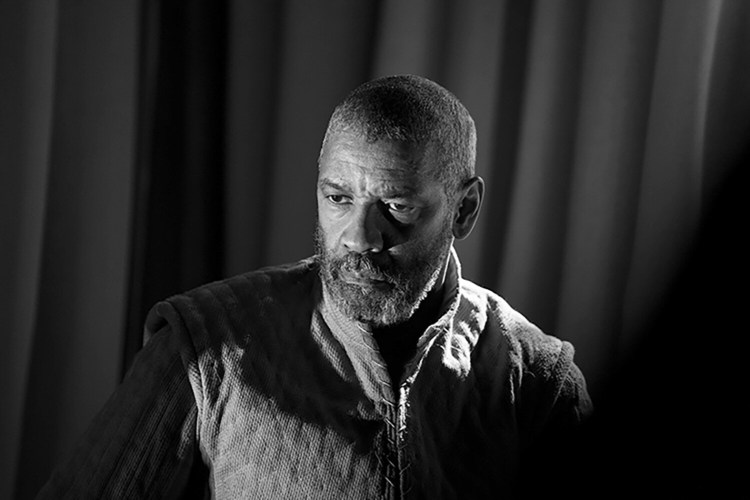Joel Coen, directing his first feature film without his brother, Ethan, brings a spare, coolheaded elegance to William Shakespeare’s blasted heath in “The Tragedy of Macbeth,” his minimalist-maximalist adaptation of the famous 17th century play.
In fact, Coen’s production is so stylized, so stripped of visual and behavioral distractions, that it could be unfolding anywhere – not just in an embattled kingdom in Scotland, but within the chilly confines of an Ingmar Bergman movie or the ruthless backrooms of Capitol Hill. The Scottish Play, like Shakespeare’s finest creations, is nothing if not elastic, as well-suited to the political machinations of his own age as to ours.
“The Tragedy of Macbeth” allows those associations to occur freely, without feeling shoehorned or editorialized. The film opens on an eerie note, with birds taking flight – or are they falling? – before morphing into a creature who delivers her gnomic pronouncements with an otherworldly caw, her limbs contorting into supernatural angles and shapes. Those familiar with “Macbeth” will instantly recognize the play’s three witches, embodied here by the great Kathryn Hunter as Shakespeare’s weird sisters rolled into a startling, unsettling, utterly glorious one-woman chorus.
When Hunter’s character encounters a general named Macbeth (Denzel Washington), his destiny is sealed: He will embark on an addled mission to take the crown from King Duncan (Brendan Gleeson), urged on by his loving and pathologically ambitious wife, Lady Macbeth (Frances McDormand). The pursuit of power by any means necessary – and the moral injury that ensues – feels both ancient and urgently new, especially when it’s animated by the artistry and acute intelligence on display here.

Denzel Washington, left, and Frances McDormand in “The Tragedy of Macbeth.” Alison Rosa/A24/Apple TV Plus
Those principles begin with Coen, who wisely strips down the visuals to give the actors and Shakespeare’s language suitable room to breathe. Improbably, he does that by containing the field of action: Filming “The Tragedy of Macbeth” in a squared-off aspect ratio, in black-and-white, limiting his sets to a collection of Brutalist spaces with imposing vertical walls, Coen provides just the right backdrop for his cast to take full ownership of the material, and for the audience to focus completely, not just on what they say, but what they mean.
For such a compact and efficient vessel, “The Tragedy of Macbeth” pours forth seemingly endless wellsprings of language, emotion and psychological depth. Coen has retained Shakespeare’s original text, which presents challenges that only increase as contemporary familiarity decreases; Washington and McDormand demonstrate an ease with Shakespeare’s English that never feels offhand exactly, but also never feels forced or rote. Washington’s facility with oratory will come as no surprise to anyone who saw him in Kenneth Branagh’s “Much Ado About Nothing” – not to mention the August Wilson cycle. His authority, combined with his simple presence as one of the last bona fide big-screen movie stars, is enough to make his Macbeth an interpretation for the ages. By the time he delivers Macbeth’s heartbreaking “Tomorrow and tomorrow and tomorrow” soliloquy, the audience is in the palm of his hand.
As for Washington’s character’s hand, are we in his hand, or someone else’s? The appendage in question might more accurately belong to his wife – the legendary schemer, portrayed by McDormand with her usual flinty, unfussy directness – or the fates that continually shape events in “The Tragedy of Macbeth” by way of spells, prophecies and Hunter’s shape-shifting avatar.
Within the world that Coen and his prodigious cast have created – with the help of Carter Burwell’s moody score and Corey Hawkins’s brief but impressive turn as Macduff – “The Tragedy of Macbeth” becomes both a filmy dreamscape and taut documentary, of how love and loyalty, mythologizing and madness can feed into desperate acts of entitlement and self-belief. This stuff never gets old, in art or entertainment: an enduring truth to which this production attests with a dazzling combination of simplicity, poetry and unsparing insight.
Send questions/comments to the editors.



Comments are no longer available on this story